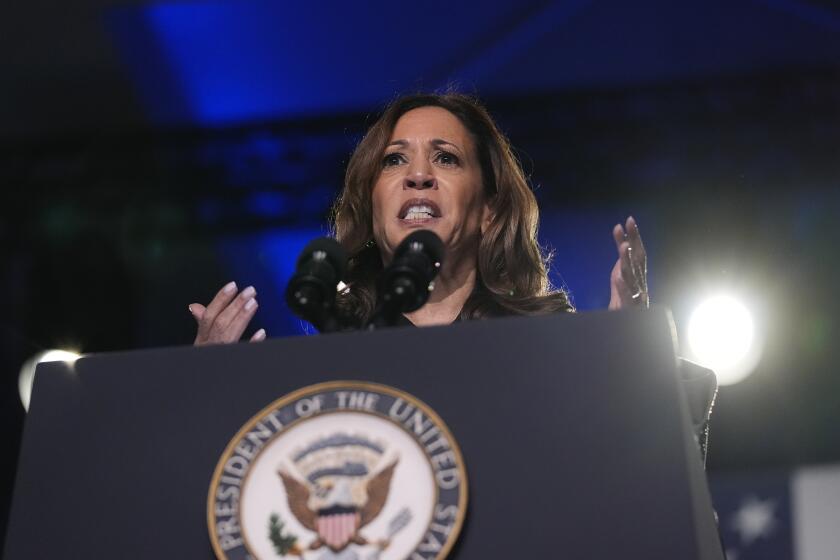2008 Race Just Got Hazier for Democrats
In a surprise decision that reconfigures the race for the 2008 Democratic presidential nomination, former Virginia Gov. Mark Warner announced Thursday that he would not run, saying he was unwilling to put his family second to a presidential campaign.
Warner, a centrist Democrat from a Republican-leaning Southern state, was considered by many Democratic strategists to be the strongest potential rival to Sen. Hillary Rodham Clinton (D-N.Y.), the early front-runner for the nomination.
His decision opens the field for other candidates hoping to present themselves as centrists, including Sen. Evan Bayh (D-Ind.), Iowa Gov. Tom Vilsack and New Mexico Gov. Bill Richardson.
“The great dynamic in this race is: Who are the one or two others in the pack who can break out and challenge Sen. Clinton?” said Simon Rosenberg, founder of the New Democrat Network, an organization that promotes progressive candidates.
“This benefits all the people who are going to be challenging Hillary.”
Warner’s stature among Democrats was based less on his nationwide visibility -- he polled in the single digits -- but more on the centrist record he built as governor.
He left office earlier this year with high approval ratings from Democrats and Republicans.
“The idea [is] that the way that Democrats win the White House is to nominate somebody who has won election in a red state,” said Jennifer Duffy, a political analyst at the nonpartisan Cook Political Report. “He had a very successful term. He had a lot to brag about.”
Warner dismissed speculation that his decision was based on any liabilities he would have had as a candidate.
“I can say with complete conviction, 15 months out from the first nominating process, I think I would have as good a shot as any of the potential candidates in the field,” he told reporters in Richmond, Va.
Instead, Warner, 51, said that after four years of putting his personal life on hold as governor, he wanted to spend more time with his three teenage daughters.
“While politically this appears to be the right time for me to take the plunge, at this point I want to have a real life,” Warner said. “And while the chance may never come again, I shouldn’t move forward unless I’m willing to put everything else in my life on the back burner.”
The announcement surprised many Democrats because Warner had been working assiduously since he left office to build a campaign war chest and political organization.
He had raised more than $9 million and made repeated trips to Iowa and New Hampshire, whose nominating contests are crucial for presidential runs.
Traditionally, the presidential election cycle does not begin until after the midterm election, which is Nov. 7 this year.
Unofficially, Democrats and Republicans have been working at least since the 2004 election to get ready for the 2008 race, when the presidency will be up for grabs.
Former North Carolina Sen. John Edwards, Massachusetts Sen. John F. Kerry and Wisconsin Sen. Russell D. Feingold are promoting themselves as more liberal alternatives to Clinton.
Also laying the groundwork for presidential runs are Sens. Joseph R. Biden Jr. of Delaware and Christopher J. Dodd of Connecticut. And some party activists are hoping that former Vice President Al Gore and Sen. Barack Obama of Illinois decide to make a run for the White House.
Some Democratic strategists worry about Clinton as a candidate, in part because her time as first lady made her a polarizing figure. That has focused attention on less well-known Democrats, particularly the moderates.
“The center of the race is now less crowded,” said a senior advisor to one of the other Democratic contenders, who spoke on condition of anonymity while discussing campaign strategy. “We have opportunities today that we did not have yesterday.”
Notably, Warner did not rule out running again for public office and indicated he would be willing to consider running for vice president, senator or even governor again. Warner had been barred from seeking reelection because Virginia does not allow its governors to hold consecutive terms.
“Listen,” he said, “when and where, I don’t know right now, but I can guarantee you’ll see I’m not going away from being involved in how we get our country fixed.”
Warner, who was always devoted to politics, made a fortune as a pioneer in the cellphone industry before he became a venture capitalist.
He has used his money to bankroll his campaigns, including a failed 1996 challenge to Sen. John Warner (R-Va.) and his successful run for governor in 2001.
Friends and colleagues have said that he went into business in large part to finance his political career, and most think it’s not over.
“This is a formidable competitor choosing to walk off the field. And it’s disappointing to people who were working for him,” said Kenneth Baer, who had been working as a speechwriter and advisor to Warner. “But he’s 51 years old. There’s a lot of time.”
More to Read
Get the L.A. Times Politics newsletter
Deeply reported insights into legislation, politics and policy from Sacramento, Washington and beyond. In your inbox three times per week.
You may occasionally receive promotional content from the Los Angeles Times.










